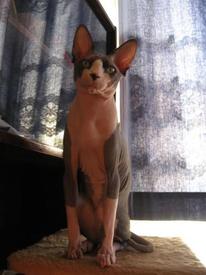
Perhaps one of the most widely recognised cats in existence; the Sphynx developed only recently and has enjoyed great popularity from its first introduction in the 1960s. The emergence of the breed was as a genetic mutation occurring in a litter of otherwise coated kittens. Naturally, interest in this new hairless breed was immediate and many breeders and enthusiasts wanted to try and re-create litters with the hairless gene. To achieve this, breeders across Europe and North America started a careful breeding program that saw them pairing cats with normal coats to the hairless Sphynx, then breeding the resulting offspring back to the Sphynx, thus expanding the gene pool. The Sphynx is extremely popular with cat registries across the globe and gained championship status from the Cat Fanciers Association in 2002.
The Sphynx is highly distinctive in both appearance and structure for reasons besides its lack of hair. With large ears, a small head shaped like a wedge, long, nimble legs and wrinkled skin, the Sphynx is an interesting cat to set your sights on. The skin is covered in a down-like fur that is fine and very soft to the touch. This medium-sized cat is muscular yet agile, and is capable of climbing to great heights. It is also light on its feet, has keen hunting instincts, and is intuitive enough to gauge situations, people, and moods. The Sphynx is permissible in any patterning or colour, from solid and pointed colours, to tortoiseshell and tabby.
Owners, breeders and enthusiasts describe the Sphynx as a cat unlike any other. With a curious and intelligent nature, this cat will never miss a trick! Compatible with children and other house pets, the Sphynx makes a delightful companion pet with a balanced temperament and easy-going disposition. The Sphynx is reasonably demanding of attention and is guaranteed to follow you wherever you go, bestowing love and affection on you at every opportunity. When its devotion is reciprocated, the Sphynx will thrive as an indoor cat, warmly welcoming visitors and demonstrating its very best behaviours! Generally speaking, a fully-grown Sphynx will weigh an average of 10 pounds, with a typical life expectancy of 10-15 years.
Due to its lack of coat, the Sphynx is vulnerable in cold climates and needs insulation and protection during the cold seasons. The Sphynx is also prone to skin complaints, particularly cutaneous mastocytosis and urticaria pigmentosa and should be bathed once a week to reduce the build up of body oils that would normally be absorbed by the coat. Besides this, cases of hypertrophic cardiomyopathy, a common type of heart disease in cats, as well as hereditary myopathy, a muscle degenerative disease, are documented in the breed. Periodontal disease is another problem to try and be avoided.
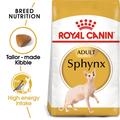
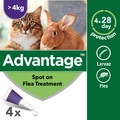
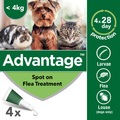
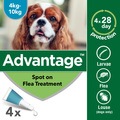



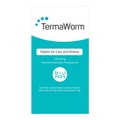
From West Midlands, United Kingdom
I have 1 lively sphynx and like other owners have stated the bond you have with your sphynx is like no other cat. Sphynx cats are more like a dog than a cat my baby follows me around if i leave the room and she doesnt realise i left she will meow and i have to tell her where i am she will come to me. Ive taught my sphynx to play catch with an hair bobble she is also a huge fuss pot and loves a cuddle and i find no 2 days are alike as she always up to mischief and likes to keep me on my toes. But every night without fail she will come and snuggle under the duvet and falls asleep in my arms
From Buckinghamshire, United Kingdom
You must have time and love for these so adorable cats. They wear you out and are constantly wanting attention. They are the most loving and caring and give them the attention they need you will form a bond like no other animal. We have 3, and 3 crossed with a Russian Blue, life is never dull and we are truly thankful they all came to live with us.